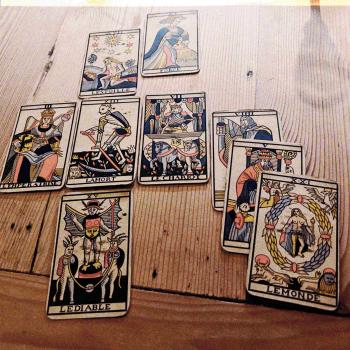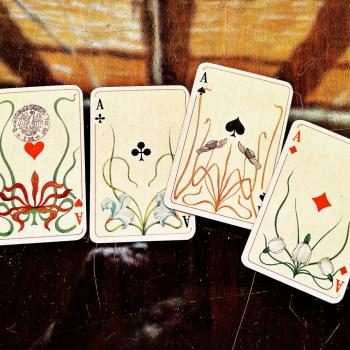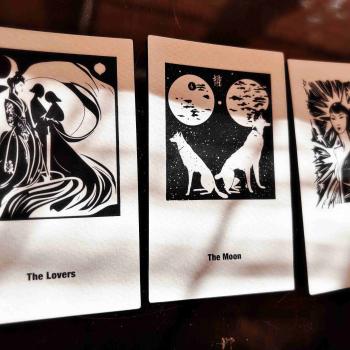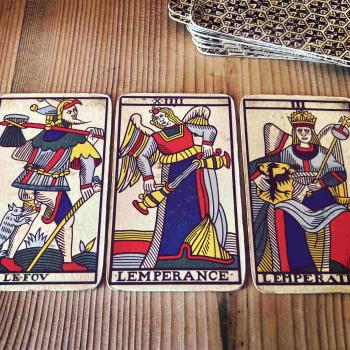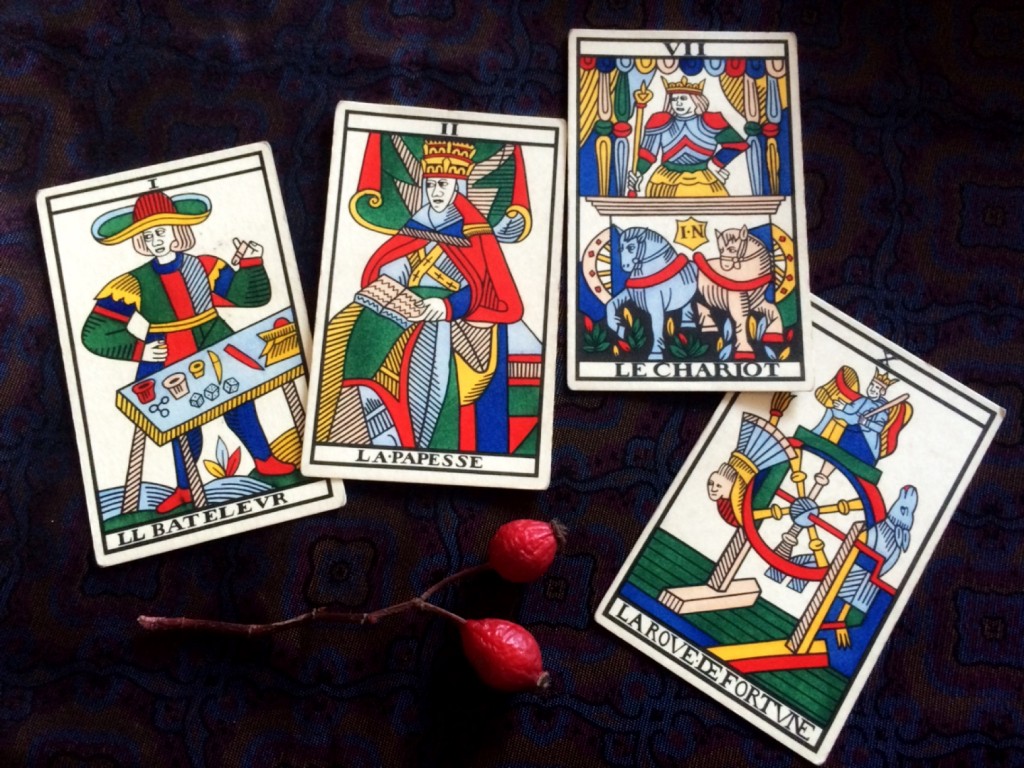
Here are a couple of statements that make me think about what others are saying when they entice people to some nice and cozy positive action:
- “Take the card of the Magician to your basement. It will help you with your conjuring.”
- “Place the High Priestess on your altar. She will give you wisdom.”
- “Put the Charioteer on your dashboard when you drive. He will help you avoid accidents.”
- “Place the Wheel of Fortune in your sleeve when you go out gambling. It will help you turn your luck.”
Sympathetic Failure
While there is some truth to this kind of sympathetic magic, when we follow the laws of similitude and correspondence, such as when we say that “this is that” — there is also something to be said about the situation when sympathetic magic fails.
Why does it fail? It is always much easier to explain away, rather than explain why the resulting acts don’t follow the initial intention. When magic fails we usually blame it on the props — urgh, my new black dress was too long and I stumbled by the altar — or we blame it on the sudden realization that our magic was not performed at the right planetary hour. We can also blame it on our voice, too loud or too dull, or the content of our prayer — not enflamed enough. Finally we can also say in defeat: “I was too exhausted for this ecstatic dance, and therefore no gods showed up for my show.”
While, indeed, what causes magic to fail is not giving it enough time to unfold according to our presence in it at the time we perform it–often felt more like an absence–I find that the real problem is not with time, but rather with fear.
I Don’t Know What I’m Doing but I’m Brave
Imagine what would happen if we allowed the pack of cards itself to determine the nature of the position that we must adopt vis-à-vis what we normally call “sympathetic magic.”
Imagine what would happen of we dared to leave it up to the cards to suggest which tutelary spirit is better suited for company in our dungeon than the ones we immediately associate with safety and “feeling good stepping into it.”
Shuffle that pack and don’t make up your mind beforehand, as to who and what force is to guide you. What’s the point of divination by chance otherwise? If the point of using consciously selected cards is merely to enforce our greatness or our confidence in our magic, and make us feel good, then chances are that while we may find validity for this confirmation, it is not sure that we would be able to access the part in us that makes us feel, period; i.e. the part that is vulnerable and has the potential to change things the hard way.
I can place the Magician in my pocket because it makes me feel good, but what if I left it up to the cards themselves to suggest, through random shuffling, what is more suitable for my desire to feel good?
The Actual and the Potential
In my own practice of using cards for magic, I find that I’m infinitely better served if I dare to confront the whole range of intensity that the pack of cards presents me with than if I act as the controlling agent, dictating what should make me feel good, and in the process, eliminating what would surprise me and transform my experience. For instance, I take wisdom walks in the woods, but I never determine beforehand that such and such a card should be my companion. While a specific card can help with my focus, it rather kills off the whole idea of opening up to the potentiality of seeing “otherwise.”
Consequently, if we tried to answer this question: “Why does the practice of choosing a card to go with a certain situation make me feel good” we would find that there’s little we can come up with that makes sense. In divination, what makes sense is that we open up to all confrontation, and not only to the kind that makes us feel good or that validates us in our roles as magicians. A magician that only feels good is no magician to me.
Own Your Fear
Next time you go down to your dungeon, and you need to feel safe, try a little surprise. Shuffle that pack and ask for whatever card you get to make you think first and then act. Ask yourself these questions, while opening yourself to fear:
- How does the presence of the Devil, if he shows up, influence my conjuring?
- Would I say, “how cool, now I can be more wicked in my working,” or would I think some more about what needs to be accomplished, the Devil way?
- Do I dare to step more firmly into my role as magician and diviner with the Devil by my side, or do I feel hesitant?
- And if I did step more firmly into it, could I please know where this firmness comes from?
- Does it come from fact that I think this is cooler than getting an Angel by my side, or does it come from the fact that I actually understand what is at stake in my magic?
While some may think that such a thinking process gets in the way of ‘experiencing’ the whole magic that we try to perform, the truth of the matter is that thinking and experiencing are not mutually exclusive. What is cool is letting chance rule the experience of what we come to understand about our magic. Such an understanding can be a very hot thing. Indeed a whole experience. I find that this kind of thinking about matching a surprising card with a specific intention places us beyond the unattainable desire to have the cake and eat it too.
Yes, Please
For instance, I could have said to myself today that I wanted the High Priestess to preside over my wisdom in this post: “Please, dear High Priestess, make me sympathetic. I’m not an angry cartomancer.” But I didn’t. Instead, I asked the cards: “What topic can I write about that is sympathetic to my readers? Who will guide me, surprisingly, situationally, and sympathetically?”
The cards said:
The Tower, Judgment, The Star
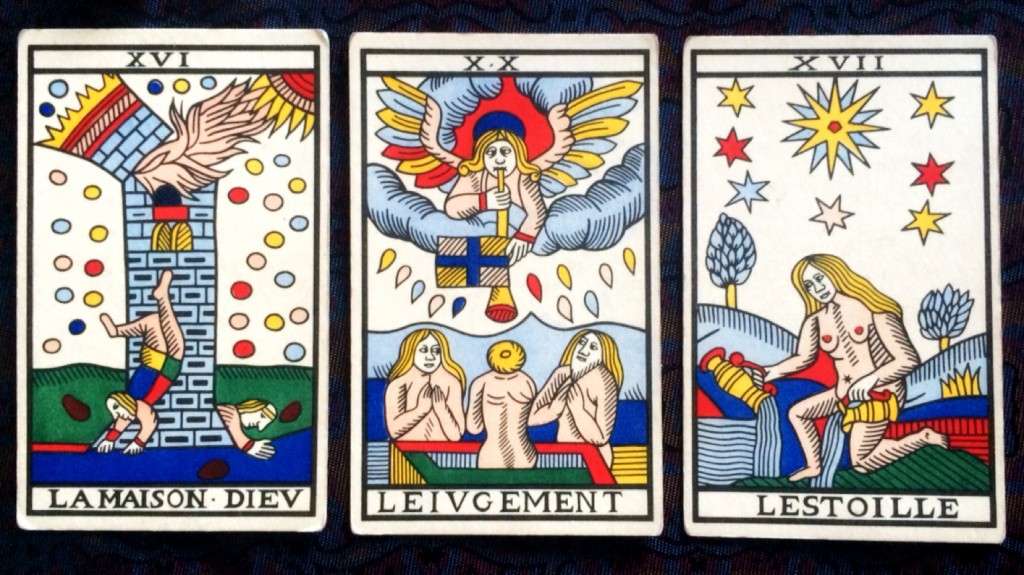
This means the following to me: ‘How about you demolish some institutional practice, again, shout as loud as you can, and then relax. Take a bath under the starry sky, and let what you give follow its course.’
The point is that if we dare to open ourselves to confrontation and conflict, we can experience the way in which we can BE in confrontation and conflict, rather than fix it according to what we think is safe. Sometimes safety is in the lion’s den not outside of it.

Patheos Pagan on Facebook.

the Agora on Facebook
The Cartomancer is published bi-monthly on the second and fourth Wednesday here on the Agora. Subscribe via RSS or e-mail!
Please use the links to the right to keep on top of activities here on the Agora as well as across the entire Patheos Pagan channel.






